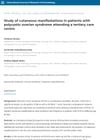 July 2023 in “Journal of Cosmetic Dermatology”
July 2023 in “Journal of Cosmetic Dermatology” Ethosomes could improve how well skin treatments work, but more research is needed on their safety and stability.
 November 2021 in “Current Otorhinolaryngology Reports”
November 2021 in “Current Otorhinolaryngology Reports” New treatments for hair loss could involve using stem cells and a process called the Wnt/beta-catenin pathway to stimulate hair growth.
 July 2019 in “International Journal of Research in Dermatology”
July 2019 in “International Journal of Research in Dermatology” Women with PCOS often have acne, obesity, and excess hair, especially on the chin and upper lip.
December 2022 in “Molecular Pharmaceutics” Latanoprost-loaded nanotransfersomes could help treat hair loss by promoting hair growth.
April 2022 in “Journal of Investigative Dermatology” Androgenetic alopecia causes hair thinning due to increased androgen activity, treatable with minoxidil and finasteride.
July 2022 in “Journal of Cosmetic Dermatology” Isotretinoin with tacrolimus may be more effective short-term for treating frontal fibrosing alopecia than finasteride with tacrolimus.
January 2022 in “Springer eBooks” January 2021 in “Menoufia Medical Journal (Print)” Androgenetic alopecia negatively affects emotions and self-confidence, especially in younger people.
December 2020 in “Journal of Skin and Sexually Transmitted Diseases” No strong link between testosterone or DHEAS levels and acne or hair loss in females.
January 2016 in “Dermatology Online Journal” Hormonal therapy changes skin and hair in transgender patients, who need better researched dermatologic care.
 January 2017 in “Elsevier eBooks”
January 2017 in “Elsevier eBooks” Stress and hormones like progesterone can affect absence seizures, but their effects change with different life stages.
 October 2017 in “Springer eBooks”
October 2017 in “Springer eBooks” A thorough initial check-up is essential before sperm banking to ensure the best chance of preserving good quality sperm.
3 citations,
October 2023 in “Cosmetics” Healthy lifestyle changes can significantly improve skin health as you age.
 64 citations,
January 2009 in “Gynecological Endocrinology”
64 citations,
January 2009 in “Gynecological Endocrinology” Myo-inositol helps improve skin conditions and metabolic profiles in young women with PCOS.
 17 citations,
May 2003 in “Journal of The American Academy of Dermatology”
17 citations,
May 2003 in “Journal of The American Academy of Dermatology” Hair from balding and non-balding areas regrows similarly on mice.
 16 citations,
May 2019 in “Hormone and Metabolic Research”
16 citations,
May 2019 in “Hormone and Metabolic Research” Selenium might help with insulin resistance and cholesterol in PCOS, but more research is needed to confirm its benefits.
 11 citations,
September 2013 in “Journal of the Egyptian Women's Dermatologic Society (Print)”
11 citations,
September 2013 in “Journal of the Egyptian Women's Dermatologic Society (Print)” Various treatments exist for hair loss, but more research is needed for better options.
 June 2022 in “Journal of the turkish academy of dermatology”
June 2022 in “Journal of the turkish academy of dermatology” The COVID-19 quarantine in Turkey disrupted dermatological care, increased stress-related skin issues, and showed the need for psychological support and teledermatology.

Spironolactone with an oral contraceptive improved hair growth in women with hirsutism.
 January 2019 in “Kocaeli tıp dergisi”
January 2019 in “Kocaeli tıp dergisi” People with chronic hair loss may have a higher chance of Vitamin B12 deficiency.
 January 2014 in “International Journal of Athletic Therapy and training”
January 2014 in “International Journal of Athletic Therapy and training” A female runner's hair loss was caused by stress from surgery and recovery, but her hair returned to normal in 5 months.
 3 citations,
January 2017 in “Indian journal of health sciences and biomedical research KLEU”
3 citations,
January 2017 in “Indian journal of health sciences and biomedical research KLEU” Low iron levels are significantly linked to hair loss in women.
 3 citations,
June 1981 in “PubMed”
3 citations,
June 1981 in “PubMed” Taking hormonal contraceptives can cause skin changes, including hair loss, due to the effects of synthetic sex hormones.
 November 2020 in “ALEXMED ePosters (Online)”
November 2020 in “ALEXMED ePosters (Online)” People with PCOS often have skin problems like excessive hair growth, hair loss, acne, and dark patches, which are linked to hormonal and metabolic imbalances.
 4 citations,
June 2017 in “Endocrine Reviews”
4 citations,
June 2017 in “Endocrine Reviews” Dihydrotestosterone (DHT) mainly affects nearby cells, doesn't significantly change prostate hormonal environment or cancer risk, and doesn't play a main role in causing hair loss or acne. More research is needed on its effects on heart health, sexual function, and bone health.
 11 citations,
April 2018 in “Nutrition Research”
11 citations,
April 2018 in “Nutrition Research” Chromium supplements don't help with weight loss or improve hormone and metabolism issues in people with polycystic ovary syndrome.
 3 citations,
July 2014 in “Indian Journal of Surgery”
3 citations,
July 2014 in “Indian Journal of Surgery” Sex hormones might influence bladder cancer development, and aromatase inhibitors could increase risk in postmenopausal women.
 2 citations,
January 2014 in “Springer eBooks”
2 citations,
January 2014 in “Springer eBooks” Polycystic Ovary Syndrome (PCOS) often leads to severe acne, and lifestyle changes and hormonal treatments can help manage it.
 July 2019 in “Journal of Investigative Dermatology”
July 2019 in “Journal of Investigative Dermatology” The research found that male pattern hair loss is mostly genetic and involves hair thinning due to hormonal effects and changes in gene expression.
 2 citations,
January 1984 in “Progress in neuro-psychopharmacology & biological psychiatry”
2 citations,
January 1984 in “Progress in neuro-psychopharmacology & biological psychiatry” Benzodiazepines changed hormone levels but did not affect hair growth in women with idiopathic hirsutism.






















